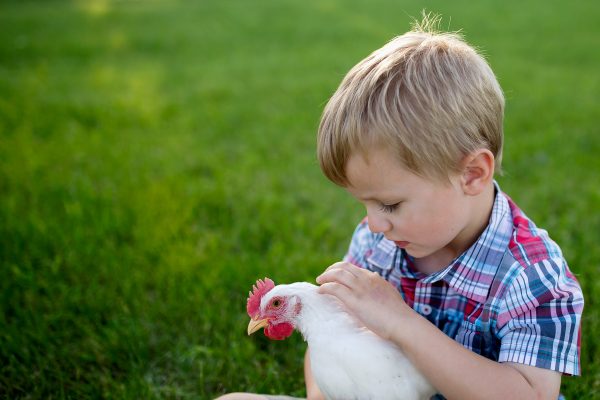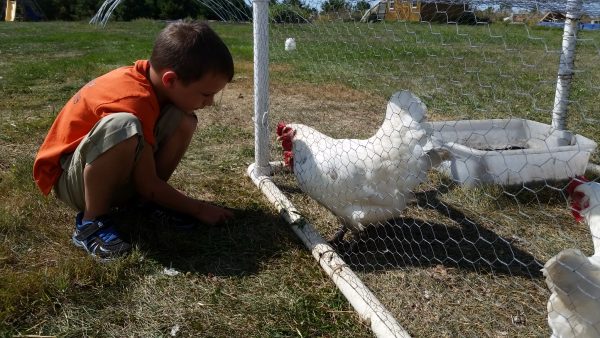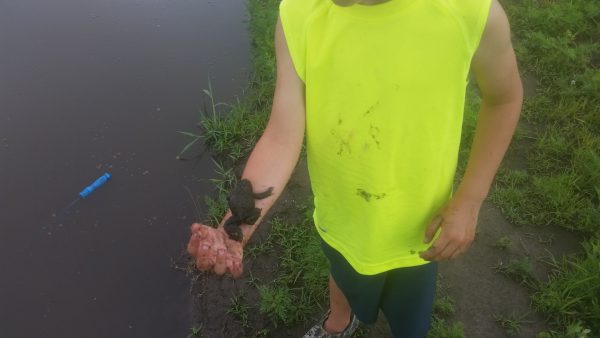What Is Magical to a Child?
Kids and animals are a magical combination.
Nature holds a fascination for all people, but kids are especially entranced by the natural world. As adults, we are sometimes too busy to “stop and smell the roses,” but kids are always more than willing to explore and discover new things.
Animals, domestic and wild, are also natural explorers. Pairing a child up with a dog, cat, or other furry friend creates a lifelong bond between child and animal.
From plants to bugs to animals, the natural world provides a classroom perfect for learning.

Perfect Partners
Kids and animals are perfect partners. There are many studies that show the positive effects that pets have on kids, including the following:
- Increased self-esteem
- Heightened sense of responsibility
- More physical activity
- Better social and emotional health
As with people, building trust is key to developing a healthy relationship with all animals. Kids are naturally geared toward succeeding at this. Their small size and soft voices calm and soothe, paving the way to a lasting relationship.
But that is only the beginning. Animals are also key to a healthy ecosystem and provide countless learning opportunities. How can we teach kids that animals are even more than our fluffy friends?
Can We Get a Puppy?
Whether it is a puppy, fish, or kitten, every kid has at some point asked for a pet. They swear they will take care of it, feed it, water it, and play with it … but they quickly lose interest once the novelty has worn off.
One way to ensure that they follow through and stay interested is by showing them how beneficial animals are to the home.
Dogs are normally the first type of pet a child will want.
With their furry faces and playful nature, it’s no wonder that they are a child’s dream pet. But dogs can be so much more than just a cuddly companion.
Dogs can help by guarding chickens and other livestock; by herding cattle and, in some cases, kids to safety; and by protecting their territory against predators and threats.
Most dogs have a natural instinct to protect.
Through proper training and good treatment, that instinct can be honed, making the dog more than just a pet.
Teaching kids that there are some tasks a dog could help with around the homestead and making children a part of the training process, if not responsible for it, will ensure that their interest and enthusiasm stays focused.
The Wow of Meow
Kids love cats. They are playful, soft, and oh-so-cute as kittens. They are also natural hunters and lethal tools for the homestead.
Having a few outdoor cats not only reduces any mice, mole, or vole problems you may have, but also teaches kids how every type of animal and pet has a different purpose.
Kids and Animals: Life Lessons
It is easy to get attached to an animal that you see and spend time with every day. However, it is important for kids to understand not only the purpose of animals, but also the role they play in the food chain.
It is our job to care for and treat well any animal in our care, but we must also remember that any animal we intend to eat is not our pet.
Chickens are a wonderful animal to have on the homestead. They keep weeds down and pests at bay, and they help spread seeds and fertilize the garden.
But, most importantly, they provide us with food.
We have kept chickens on our homestead for four years now, and our boys have been a part of every life stage from freshly hatched chicks to full-grown hens.
Just like kids should be helpers in the garden from seed to harvest, they need to be a part of the raising and butchering of any livestock that will eventually end up on the table. They need to know and understand that the chicken they see in the grocery store was once a living, breathing bird that someone raised for egg or meat production.
When we butchered our first flock, our boys were a part of the process.
We talked to them about what the chickens had provided for us in life, and what they would be giving with their death.
Get the kids involved, but make sure to tell them why and how the butchering will happen. This will prepare them for the process and make it less scary to witness.
- Talk about the purpose of the animal on the homestead.
- Thank the animal for providing labor and food.
- Tell the kids what will happen when the animal is butchered.
Animals are the messengers of the tree, and trees the gardens of animals. Life depends upon life. All forces, all elements, all life forms are the biomass of the tree. —Bill Mollison
Call of the Wild
Nature provides so much fodder for both the imagination and the mind. Even if you don’t live on a farm or in a remote area, you can likely find an animal to study.
Frogs and fish are a great way to introduce and study life cycles. The boys caught a frog in our swales one day and started asking questions:
- Where do frogs come from?
- How do they grow?
- Why aren’t they bumpy?
So many great questions, and all stemming from simply capturing a little frog!
These moments of curiosity and wonder can quickly turn into a brief lesson on life cycles and biology that will make a lasting impression on an interested and engaged child.
Dangerous Animals
Talking to kids about animals can also help prepare them for potentially dangerous situations.
Predators are a part of life, and teaching kids how to react when faced with certain predators can prepare them for these situations.
Coyotes and foxes are common animals in our area, and with chickens it becomes even more likely that we will encounter them at some point. We don’t want our kids to fear nature, but we do want them to have a healthy respect for animals and events that are outside of our control.
- Talk about what certain predators hunt.
- Discuss ways to be safe around them.
- Explain what to do when threatened.
Teaching kids about animals and the role they play in a vibrant and robust ecosystem will help ensure that children treat them with care and respect. Kids need to understand that their job is to help by working with these partners nature provides.
Understanding the role animals play in a healthy ecosystem will help kids see the world for what it is—a garden of endless possibility.
The health of soil, plant, animal, and man is one and indivisible. —Sir William Howard
References
http://www.parents.com/parenting/pets/kids/pets-good-for-kids/
https://permaculturenews.org/category/animals/working-animals/
https://www.goodreads.com/work/quotes/371765
Melissa Durbin is a Midwest homemaker, homesteader, and homeschooler. She has a passion for writing and loves to share all the triumphs and trials of gardening, raising chickens, and homeschooling two little boys.
In 2012, Melissa and her family moved from Metro Detroit to Illinois onto a 5-acre patch of flat land with poor soil and few trees. Since then, they’ve put in over a hundred fruit trees, built a small vineyard, planted a food hedge, and started a garden.
Melissa started blogging to chronicle the many adventures she’s had as a rookie homesteader. Her blog, https://apinchofhomestead.com/, is a mix of humorous anecdotes, true-life-inspired fiction and poetry, and lessons learned.
Melissa has a background in project management and writing. She worked in advertising for almost ten years before turning in the briefcase and starting her new life as a homesteader.










COMMENTS(4)
Thanks for good article regarding kids and nature and animals. But it makes me sad to see that you still think it’s neccesary kill our friends we call animals. It would be nice to see you incorporate the latest science and biology that shows that we can indeed have all kinds of animals in our garden or house for pets and support in different ways, but there really is no need to kill them at all. We are not living in the stone age anymore and hopefully we have come to understand nature and our self a bit more by now.
Keep up the good work!
(A parent who raised his 3 children on vegan raw food and got the healthiest kids doctors ever seen)
I absolutely agree with you and was disgusted about half way through this article! I also have three happy, healthy children! I would love to see more articles talking about GROWING food, not slaughtering it. I would love to see more articles talking about the health benefits of eating plants, and making people aware of the dangers of eating meat. Let’s all show more compassion for our world.
Thank you for your comments and I do appreciate your point of view. We are all different, have different beliefs and approach life in different ways. We try very hard to show respect and gratitude to the animals we plan to cull and treat them well while they are in our care. I hope that we can agree to disagree and continue to enjoy our planet in the healthiest (whether vegan or carnivore) and most sustainable way we can.
Also, if you click on “edible landscapes” on the top left of this page, there are many articles on growing and eating vegetables, fruits and produce. I wrote an article called “Kids and Gardening: Fertilizing Our Future” that may appeal to you more than this article. Thank you!